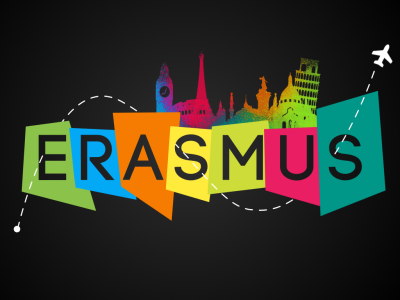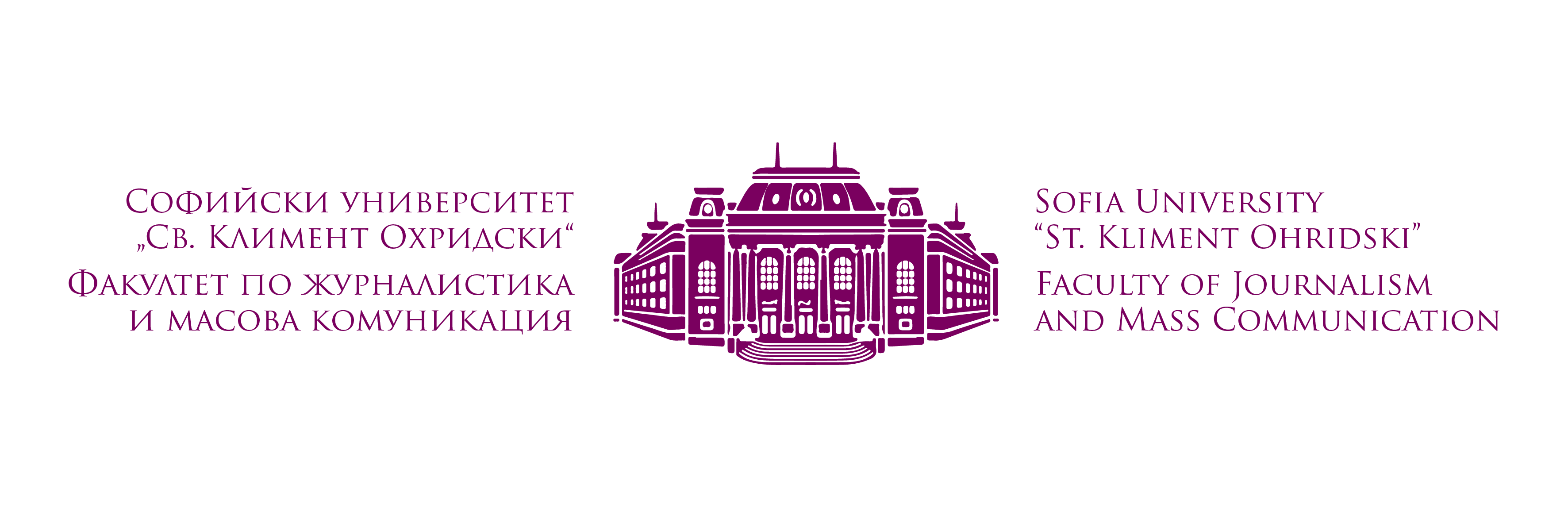
Faculty coordinator: Assoc. Prof. Dr. Diana Petkova
ERASMUS+ INCOMING STUDENTS
During the academic year 2022/2023 the incoming students at the Faculty of Journalism and Mass Communication can choose between the following subjects:
COURSES IN FOREIGN LANGUAGES for ERASMUS INCOMING STUDENTS
2022/2023
Programme: Journalism
|
Course code |
Course title (in English) |
Language of instruction |
Course offered to BA/BS, MA/MS, PhD |
Semester (winter/ summer) |
ECTS |
Workload (hours) |
Lecturer/s’s name |
Lecturer/s’s
|
||
|
Lectures |
Seminars |
Practical work |
||||||||
|
И676 |
Multiculturalism, Minorities and Media |
English |
BA/BS |
Summer |
4 |
45 |
0 |
|
Svetlozar Kirilov |
|
|
Short description of the course (in the language of instruction): The course discusses major processes related to contemporary multicultural societies, the state of minorities (racial, ethnic, religious, etc.) and the role of the media. Some of the topics are listed below: Multicultural society: its structure and problems. What is multiculturalism? What is culture? The understanding of minorities: racial, ethnic, religious, linguistic and others. Multiculturalism vs. nationalism and ethnocentrism. Prejudices. Clash over resources. “Cultural wars”: fundamental differences in values and norms. Muslim communities. Religion and religious differences. Debates whether Islam encourages violence and terrorism or not. Comparison between the Bible and the Quran. Theories of civilizations. International migration. The European debate. Roma (Gypsy) communities. The explanations of the plight of the Roma: discrimination or Romani culture? Culture of poverty and the underclass. The image of the Roma in East European cinema. Hate speech. The problem: Avoidance of hate speech vs. Freedom of Expression. Hate speech vs. political correctness. The model of multicultural society in the Race, racism, and media. African Americans in the Multicultural society in Jews and antisemitism. Persecution of Jews in Minority media. The policy of the Council of Europe to support community media. |
||||||||||
Programme: Digital Media and Communication
|
Course code |
Course title (in English) |
Language of instruction |
Course offered to BA/BS, MA/MS, PhD |
Semester (winter/ summer) |
ECTS |
Workload (hours) |
Lecturer/s’s name |
Lecturer/s’s
|
||
|
Lectures |
Seminars |
Practical work |
||||||||
|
C013 |
Intercultural Communication |
English |
MA |
winter |
4 |
60 |
0 |
60 |
Diana Petkova |
|
|
Short description of the course (in the language of instruction): This course dwells on the theoretical and practical aspects of communication in intercultural environment. It introduces the most important theories and research models of intercultural communication. The emphasis is on both verbal and non-verbal intercultural communication. Along with the theoretical basis, the course also presents concrete cases of intercultural clashes, negotiations and conflict resolutions. Thus, students are expected to be successful communicators on culturally diverse communication scenes. |
||||||||||
|
Requirements for enrollment: YES/NO If any, please describe the specific requirements: No Programme: Advertisement and Public Communication |
||||||||||
|
Course code |
Course title (in English) |
Language of instruction |
Course offered to BA/BS, MA/MS, PhD |
Semester (winter/ summer) |
ECTS |
Workload (hours) |
Lecturer/s’s name |
Lecturer/s’s
|
||
|
Lectures |
Seminars |
Practical work |
||||||||
|
З159 |
Intercultural communication |
English |
MA |
Summer |
3 |
20 |
5 |
65 |
Diana Petkova |
|
|
Short description of the course (in the language of instruction): This course dwells on the theoretical and practical aspects of communication in intercultural environment. It introduces the most important theories and research models of intercultural communication. The emphasis is on both verbal and non-verbal intercultural communication. Along with the theoretical basis, the course also presents concrete cases of intercultural clashes, negotiations and conflict resolutions. Thus, students are expected to be successful communicators on culturally diverse communication scenes. |
||||||||||
Programme: Communication Management
|
Course code |
Course title (in English) |
Language of instruction |
Course offered to BA/BS, MA/MS, PhD |
Semester (summer) |
ECTS |
Workload (hours) |
Lecturer/s’s name |
Lecturer/s’s
|
||
|
Lectures |
Seminars |
Practical work |
||||||||
|
З585 |
Strategic communication |
English |
BA |
1st |
6 |
45 |
15 |
- |
Prof. Teodora Petrova , Ph.D. |
|
|
Short description of the course (in the language of instruction): The course is aimed at most important Strategy theories of strategy thinking, management and the role of strategic managers. It overlooks over the use of most effective instruments for content management in digital platforms. |
||||||||||
|
Requirements for enrollment: NO If any, please describe the specific requirements: |
||||||||||
|
Course code |
Course title (in English) |
Language of instruction |
Course offered to BA/BS, MA/MS, PhD |
Semester (winter) |
ECTS |
Workload (hours) |
Lecturer/s’s name |
Lecturer/s’s
|
||
|
Lectures |
Seminars |
Practical work |
||||||||
|
З554 |
Content Marketing |
English |
BA |
4th |
5 |
45 |
15 |
- |
Prof. Teodora Petrova, Ph.D |
|
|
Short description of the course (in the language of instruction): The course is focused on digital content marketing. How to create and what we call quality content. Which are the effective ways to reach different groups of users. |
||||||||||
|
Requirements for enrollment: NO If any, please describe the specific requirements: |
||||||||||
Programme: Communication Management
|
Course code |
Course title (in English) |
Language of instruction |
Course offered to BA/BS, MA/MS, PhD |
Semester (summer) |
ECTS |
Workload (hours) |
Lecturer/s’s name |
Lecturer/s’s
|
||
|
Lectures |
Seminars |
Practical work |
||||||||
|
И543
|
Creating Communication Effects |
English |
BA |
II |
6 |
45 |
15 |
- |
Assoc. Prof. Svetlana Stankova, Ph.D. |
|
|
Short description of the course (in the language of instruction): The course introduces the eight-step pyramid of communication effects from awareness to values, the consistency and diversity of communication elements, as well as the approaches to creating effective messages. There are also topics related to communication goals and communication strategies. It helps to identify and to use persuasive techniques in the desired communication register. |
||||||||||
|
Requirements for enrollment: NO If any, please describe the specific requirements: Programme: Public Relations |
||||||||||
|
Course code |
Course title (in English) |
Language of instruction |
Course offered to BA/BS, MA/MS, PhD |
Semester (winter) |
ECTS |
Workload (hours) |
Lecturer/s’s name |
Lecturer/s’s
|
||
|
Lectures |
Seminars |
Practical work |
||||||||
|
И444
|
Enemy Image in Media |
English |
BA |
V |
2 |
30 |
- |
- |
Assoc. Prof. Svetlana Stankova, Ph.D. |
|
|
Short description of the course (in the language of instruction): The course points out the psychological, historical, economic and ideological prerequisites for inventing enemy images in media. The discipline examines the social functions of the enemy image and provokes a discussion on the subject of hostility, which up to now has contradictory views and perceptions. The consequences of exaggeration (demonization), of the enemy images in media, are presented also as well. |
||||||||||
|
Requirements for enrollment: NO If any, please describe the specific requirements: |
||||||||||
Programme: Journalism
|
Course code |
Course title (in English) |
Language of instruction |
Course offered to BA/BS, MA/MS, PhD |
Semester (winter/ summer) |
ECTS |
Workload (hours) |
Lecturer/s’s name |
Lecturer/s’s
|
||
|
Lectures |
Seminars |
Practical work |
||||||||
|
З329 |
Investigative Journalism |
English
|
BA/BS |
Summer |
4 |
30 |
15 |
|
Teodora Georgieva |
|
|
Short description of the course (in the language of instruction): The course discusses main definitions and principles of investigative journalism. It highlights its history in Europe, in The course also discusses new phenomena and features of investigative journalism during the democratic and economic transitions, taking into account all the challenges related to funding and the emergence of another type of journalism in social networks. |
||||||||||
Programme: Digital Media and Communication
|
Course code |
Course title (in English) |
Language of instruction |
Course offered to BA/BS, MA/MS, PhD |
Semester (winter/ summer) |
ECTS |
Workload (hours) |
Lecturer/s’s name |
Lecturer/s’s
|
||||
|
Lectures |
Seminars |
Practical work |
||||||||||
|
C011 |
Fake News and Online Disinformation |
English |
MA |
W |
3 |
30 |
15 |
|
Assoc. Prof. Ralitsa Kovacheva |
|||
|
Short description of the course (in the language of instruction): The course aims at providing students with knowledge and skills needed to find, verify and analyze information in a digital environment. The course combines theoretical knowledge (concepts, classifications, research approaches and regulatory models) with practical skills and tools. Students will be introduced to various fact-checking tools and will perform different practical tasks, in order to develop skills needed to independently check different types of information. |
||||||||||||
|
Requirements for enrollment: YES/NO If any, please describe the specific requirements: |
||||||||||||
|
Programme: Digital Media and Communication |
||||||||||||
|
Course code |
Course title (in English) |
Language of instruction |
Course offered to BA/BS, MA/MS, PhD |
Semester (winter/ summer) |
ECTS |
Workload (hours) |
Lecturer/s’s name |
Lecturer/s’s
|
||||
|
Lectures |
Seminars |
Practical work |
||||||||||
|
Е014 |
International Journalism and Digital Media |
English |
MA |
S |
3 |
45 |
|
|
Assoc. Prof. Ralitsa Kovacheva |
|||
|
Short description of the course (in the language of instruction): The course aims to provide students with knowledge and skills needed to asses information and create international news stories in digital environment. A good knowledge of the current state of international relations is a prerequisite for a skillful selection of sources of information and a balanced assessment of events. Issues related to bias and balance in international journalism, the influence of ideologies and political polarisation will be discussed, as well. Practical tasks are included to help students develop skills in creating international news stories. |
||||||||||||
|
Requirements for enrollment: YES/NO If any, please describe the specific requirements: |
||||||||||||
|
Programme: Journalism |
||||||||||||
|
Course code |
Course title (in English) |
Language of instruction |
Course offered to BA/BS, MA/MS, PhD |
Semester (winter/ summer) |
ECTS |
Workload (hours) |
Lecturer/s’s name |
Lecturer/s’s
|
||||
|
Lectures |
Seminars |
Practical work |
||||||||||
|
И342 |
Global Politics and Media |
English |
BA |
S |
4 |
30 |
15 |
|
Assoc. Prof. Ralitsa Kovacheva |
|||
|
Short description of the course (in the language of instruction): |
||||||||||||
|
Requirements for enrollment: YES/NO If any, please describe the specific requirements: |
||||||||||||
|
The course gives students the opportunity to analyze the mutual influences between the media and global politics. Special attention is paid to factors such as ideologies, political polarization, post-truth, disinformation and propaganda. Students can develop students` skills in analyzing media content, as well as in writing, reporting and editing international news stories. |
||||||||||||
Programme – Public Relations
|
Course (in the foreign language) |
BA/MA |
Language |
Semester (winter/summer) |
ECTS (credits) |
Number of hours |
Professor (name and e-mail) |
||
|
Lectures |
Exercises/Seminars |
Practical work |
||||||
|
Theory of Advertising |
BA/MA |
English |
winter/summer |
|
|
|
|
Christo Kaftandjiev |
|
Theory of Advertising |
Here are analyzed different:
|
|||||||
